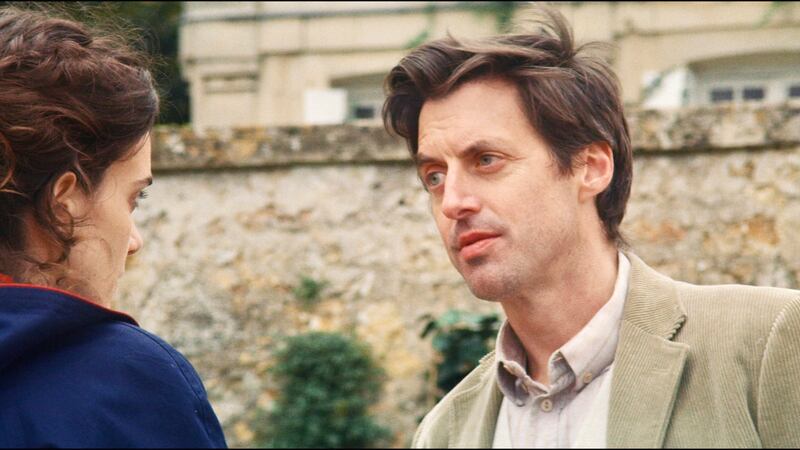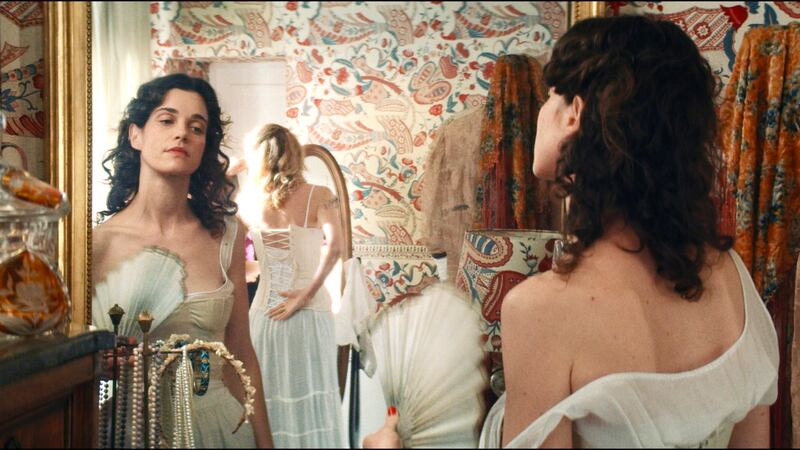Jane Austen Wrecked My Life is for the book lovers, not the romance lovers.
Written and directed by Laura Piani, this French romantic comedy joins the ever-growing roster of Austen-inspired movies. And while it’s got the makings of a Pride & Prejudice story, the real love affair at the heart of the film is about the intense and often fraught relationship between writers and the literary masterpieces that shaped them.
The movie opens in Paris’ iconic Shakespeare and Company bookstore, a place so beloved by bibliophiles it practically has its own mythology. Here, viewers meet French protagonist Agathe, played by the charming Camille Rutherford, who lives out her days surrounded by novels.

As she glides between shelves to the smooth rhythms of Solomon Burke’s “Cry to Me,” caressing the spines of her literary companions, we’re introduced to Agathe’s biggest obstacle: something from her past is causing a mental block with her writing. It’s so bad that she hasn’t written a single word—or had sex—in over two years, a fact she bemoans to her best friend and co-worker, Félix (Pablo Pauly), who clearly likes her as more than just a friend.
But before any romance can blossom, fate intervenes. A small creative breakthrough lands Agathe a spot at the Jane Austen Residency, a two-week writer’s retreat in the English countryside. That’s where she meets Oliver (Charlie Anson), the son of the couple running the event.

It’s easy to guess that Oliver will be taking on the Mr. Darcy-sized role. From his very first encounter with Agathe, Oliver comes across as proud, reserved, and remarkably good at making her misunderstand him, just like his literary counterpart. Oliver also happens to be Austen’s great-great-grandnephew, though he takes little pride in his ancestry, as he believes her work is “overrated.” Naturally, Agathe loathes him for this immediately.
This is the point in the film when Piani’s script starts to fully indulge in the “rom” and “com” of rom-com, though often with mixed results. First, there’s Oliver’s conveniently timed car breakdown, trapping him and Agathe overnight and forcing them to transition from bickering to bonding. Then comes the obligatory Regency-style ball, where Oliver and Agathe share a clichéd “we’re the only two people in the room” moment. There is also a surprising amount of slapstick comedy. Agathe’s clumsiness causes her to trip over everything, solidifying her character amongst the top ranks of bumbling heroines in the romance genre.
Even with a healthy dose of self-awareness, Piani’s script has a tendency to veer from charming into cringe territory and does little to push Agathe’s emotional journey forward. Unlike her peers at the retreat, she hasn’t put anything to paper yet. And rather than face the root cause of this issue, Agathe does what any romance book lover does best: she embraces the fantasy. She dives headfirst into exploring her two romantic options: Félix, the person who knows her best, and Oliver, the man to whom she feels inexplicably drawn.

Despite her best efforts to live the romantic comedy life, Agathe can’t outrun her problems forever. Like Anne Elliot in Persuasion—her Austen heroine of choice—she must finally confront the emotional weight that’s been holding her back, before she can find her authorial voice.
In the end, Jane Austen Wrecked My Life delivers exactly what its title promises; it’s charming, romantic, and delightfully bookish. While the film occasionally stumbles over its formulaic impulses, it captures a truth universal to all Austen novels: happiness is found with a willingness to confront what holds us back. Oh, and of course, it doesn’t hurt to find love, too. After all, who could turn down Mr. Darcy?
The post Jane Austen (Didn’t) Wreck Our Romantic Lives appeared first on The Daily Beast.




